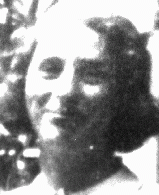You searched for: %E6%B3%A2%E5%9C%BA%E6%8A%95%E8%B5%84%E7%90%86%E8%B4%A2%E7%B3%BB%E7%BB%9F%E5%AE%9A%E5%88%B6%E5%BC%80%E5%8F%91%E3%80%90TG%EF%BF%BD%EF%BF%BD%EF%BF%BD%EF%BF%BD%EF%BF%BD%EF%BF%BD%EF%BF%BD%EF%BF%BD%EF%BF%BD%40EK7676%E3%80%91%E5%B9%B3%E5%8F%B0%E5%8C%85%E7%BD%91%E6%90%AD%E5%BB%BA%E6%B3%A2%E5%9C%BA%E6%8A%95%E8%B5%84%E7%90%86%E8%B4%A2%E7%B3%BB%E7%BB%9F%E5%AE%9A%E5%88%B6%E5%BC%80%E5%8F%91%E3%80%90TG%EF%BF%BD%EF%BF%BD%EF%BF%BD%EF%BF%BD%EF%BF%BD%EF%BF%BD%EF%BF%BD%EF%BF%BD%EF%BF%BD%40EK7676%E3%80%91%E5%B9%B3%E5%8F%B0%E5%8C%85%E7%BD%91%E6%90%AD%E5%BB%BAQbGWPZUFlH
<< Previous | Displaying results 51-60 of 196 for "%E6%B3%A2%E5%9C%BA%E6%8A%95%E8%B5%84%E7%90%86%E8%B4%A2%E7%B3%BB%E7%BB%9F%E5%AE%9A%E5%88%B6%E5%BC%80%E5%8F%91%E3%80%90TG%EF%BF%BD%EF%BF%BD%EF%BF%BD%EF%BF%BD%EF%BF%BD%EF%BF%BD%EF%BF%BD%EF%BF%BD%EF%BF%BD%40EK7676%E3%80%91%E5%B9%B3%E5%8F%B0%E5%8C%85%E7%BD%91%E6%90%AD%E5%BB%BA%E6%B3%A2%E5%9C%BA%E6%8A%95%E8%B5%84%E7%90%86%E8%B4%A2%E7%B3%BB%E7%BB%9F%E5%AE%9A%E5%88%B6%E5%BC%80%E5%8F%91%E3%80%90TG%EF%BF%BD%EF%BF%BD%EF%BF%BD%EF%BF%BD%EF%BF%BD%EF%BF%BD%EF%BF%BD%EF%BF%BD%EF%BF%BD%40EK7676%E3%80%91%E5%B9%B3%E5%8F%B0%E5%8C%85%E7%BD%91%E6%90%AD%E5%BB%BAQbGWPZUFlH" | Next >>
-
The Weimar Republic
ArticleThe Weimar Republic was a liberal democratic republic founded in Germany in the aftermath of WWI. Learn about the era’s political and economic crises and social trends.
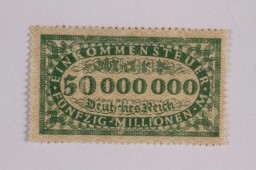
-
Neuengamme
ArticleIn 1938, the Nazis established Neuengamme concentration camp. Learn more about camp conditions, medical experiments, and liberation.
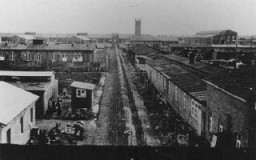
-
Mauthausen
ArticleThe Mauthausen concentration camp was established following the Nazi incorporation of Austria in 1938. Learn about the harsh conditions in the camp.
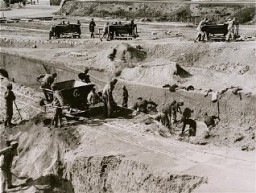
-
Voyage of the St. Louis
ArticleIn May 1939, the German transatlantic liner St. Louis sailed from Germany to Cuba. Most of the passengers were Jews fleeing Nazi Germany. Learn more about the voyage.
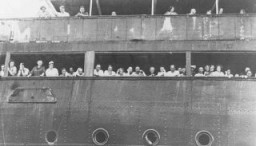
-
Writing the News
ArticleShortly after taking power in January 1933, Adolf Hitler and the Nazis took control of German newspapers, detailing how the news was to be reported.
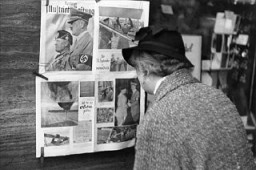
-
Lend-Lease
ArticleLearn more about the Lend-Lease Act, which was the American policy that extended material aid to the WWII Allied powers from 1941-1945.
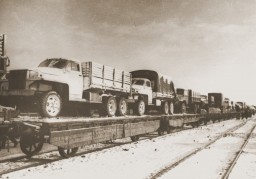
-
The 69th Infantry Division during World War II
ArticleThe 69th Infantry Division participated in major WWII campaigns and is recognized for liberating the Leipzig-Thekla subcamp of Buchenwald in 1945.
-
Lithuania
ArticleAs part of the Holocaust, the Germans murdered about 90% of Jews in Lithuania. Read more about the tragic experience of Lithuanian Jews during World War II.
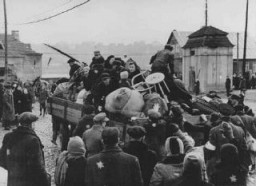
-
Jeno Muhlrad
ID CardJeno was the youngest of five children born to Jewish parents living in a suburb of Budapest. His father was a wholesale merchant who sold beer to restaurants and stores. After receiving a university diploma, Jeno became a pharmacist. He and his wife, Aranka, and their two children, Eva and Andras, shared a large old house in Ujpest with Jeno's father and other members of the extended family. 1933-39: Jeno's friends and family have helped him raise the large amount of money he needs to lease his own…
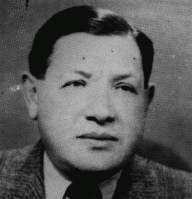
-
Dora Unger
ID CardDora, her parents, brother, aunt, uncle, and two cousins lived together in her grandfather's home in Essen, Germany. The Ungers were an observant Jewish family, and when Dora was 8, she began to regularly attend meetings of Brit HaNoar, a religious youth organization. 1933-39: In October 1938 a teacher, with tears in her eyes, came to Dora at the municipal pool, saying "Jews cannot swim here anymore." Just weeks later, on November 9, Jews were arrested and their property destroyed. A neighbor tried to…
